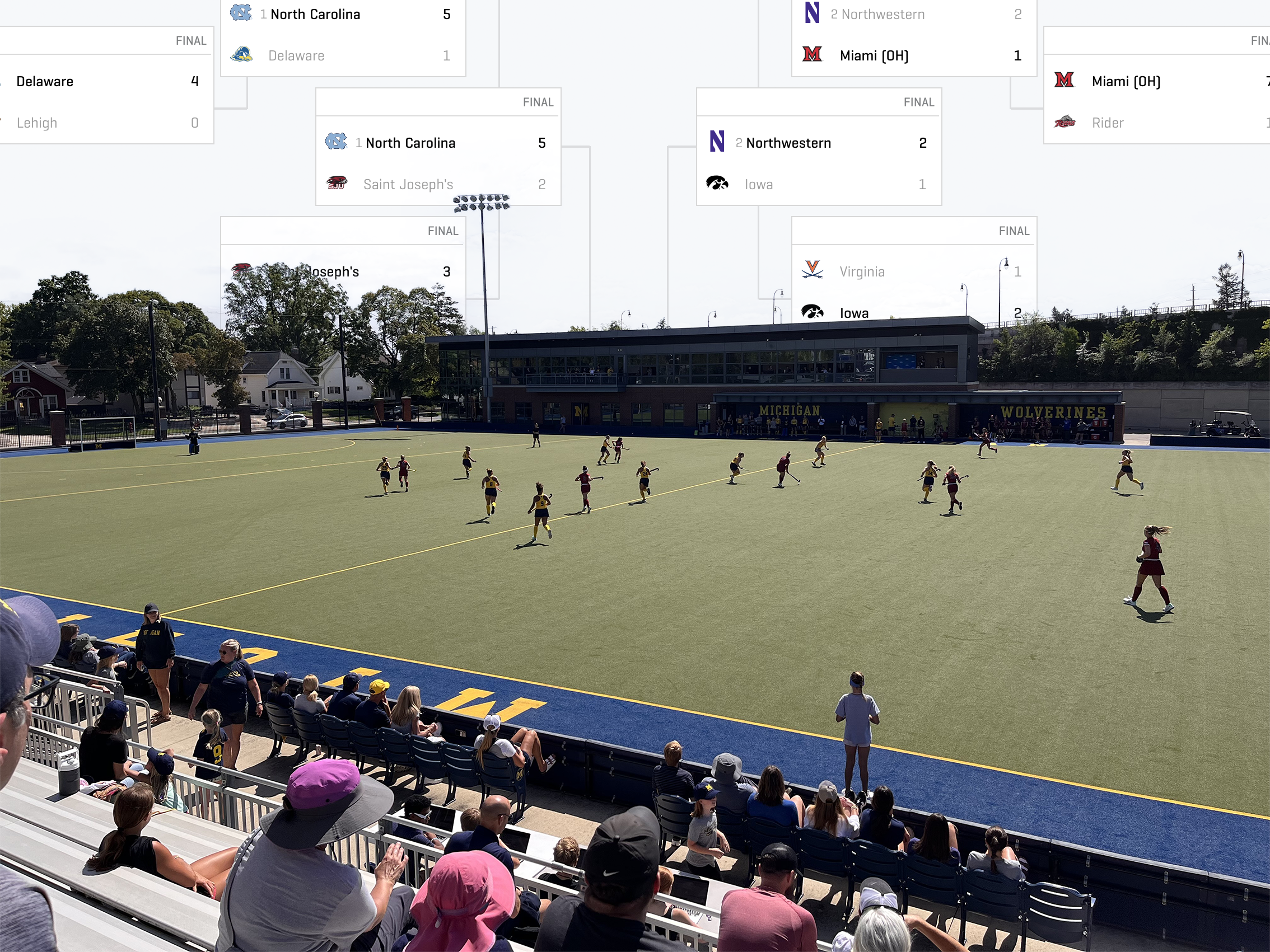Monday Bubble Watch: Field Hockey and Women's Soccer Outlooks

The fall season is starting to wind down and it's time to look ahead at the postseason. Michigan Field Hockey and Women's Soccer are still hunting for at-large bids to the NCAA Tournament. Both also have legitimate shots at winning their respective Big Ten Tournaments and making all of this moot, but the goal is to start the BTT knowing exactly what you need.
As far as the other teams go, we're going to say volleyball is out. Big Ten volleyball does not have a conference tournament where Michigan could catch fire, and the 2-11 record pretty much speaks for itself. It's a Year 0, we're giving Erin Virtue time to build her program, but for the purposes of this column we're calling a spade a spade.
Men's Soccer is also far enough off the bubble that I don't think a detailed analysis makes sense, but the path to them playing their way in is more visible. Only one team gets eliminated prior to the men's soccer BTT, and it looks like it probably won't be Michigan. They're still outside the top 100 in RPI, but their recent run of form means I'm paying attention.
Some notes before we dive in:
- All ranks mentioned are RPI ranks, not poll ranks.
- My methodology here is entirely RPI-based. The committee considers more than just RPI, but it gives us a good baseline for where things stand. If we look at last year's final pre-tournament field hockey RPI, pure RPI would get you 7 of the 8 at-larges correct, with the 8th (Wake Forest) landing one RPI spot lower than the first team out (Harvard). For women's soccer, Michigan is so far to the good side of the bubble that the committee decisions at the bottom of the at-large field are going to be significant.
- For the purposes of this exercise we're assuming every conference tournament will be won by the conference's current RPI leader. This is a bad assumption, but I don't think it will have a significant impact on Michigan in either tournament. (There are also a handful of conferences in each sport that give their autobids to the regular season winner, but that does not change anything in my analysis.)
- Here's the Google Sheet I made while doing this if you want to check my work.
Field Hockey
Tournament Format
Only 18 teams make the NCAA Field Hockey Tournament, with the bottom four teams playing in an opening round to cut the field to 16 (like the basketball First Four, the opening round is always contested among the lowest-ranked conference champions).
There are 10 field hockey conferences that get automatic bids, leaving only 8 at-large spots. Last year, four went to the ACC and four went to the Big Ten. If the Big East and maybe Ivy tournaments go chalk, then the two conferences will likely split all 8 at-larges again. (The Ivy Tournament is new this year!)
Michigan Outlook
Michigan is ranked 15th in RPI. Once we filter out the conference champions and assign at-larges to the top 8 remaining teams, the last team in is Boston College, ranked 11th. At 15, Michigan is currently the 2nd team out, just behind #12 Syracuse. (The teams between them are conference leaders and are therefore in for our purposes.)
When I wrote the draft of this piece during Tuttle Time on Saturday I did not have access to updated RPI, as the NCAA updates FH RPI on Tuesdays. Michigan was ranked 21st, 6th out of the tournament. Luckily, Field Hockey Corner updates daily (or even more often)*. Michigan went 1-1 this week, beating Indiana and losing to RPI #1 Northwestern. As far as I can tell, the Northwestern loss actually helped Michigan's RPI by boosting strength of schedule. These are the benefits of playing in one of the best two conferences in the country.
All this to say that the good news is that Michigan's opportunities are in front of them. Michigan is constantly playing big games. Their next two games are against Rutgers and Maryland, both of which are on the correct side of the bubble. Michigan can help itself while directly hurting some of the other bubble teams.
* This website is run by Miami (OH)'s associate head coach, Chip Rogers. The Olympic sports community is so cool.
How worried are we about bid thieves?
We are worried about exactly one bid thief. There's a very, very high chance that if the ACC or Big Ten tournaments are won by someone other than their RPI leader, that team was a lock for an at-large anyways. If anything, Michigan might be the bid thief here; the Big Ten Tournament will be in the friendly confines of Phyllis Ocker Field.
Outside of the ACC and B1G, Big East leader and RPI #8 Liberty is the only team that leads their conference and is in an at-large position if they do not get their conference's autobid. If Liberty loses their conference tournament, they are looking like an at-large lock, the first outside of the big two conferences since 2017. That would leave just 7 bids. I hate to do this to you, but for now you're rooting for Liberty to win the Big East Tournament.
Harvard leads the Ivy League at #13, and St. Joe's leads the Atlantic 10 at #14. Either could play their way into an at-large position even with a loss in their conference tournament. However, based on how the committee treated Harvard last year, I think it is far more likely that the Ivy cannibalizes itself and a loss in the conference tournament would leave Harvard outside the bubble, especially if that loss comes from someone other than the 2-seed. The same basic logic applies to St. Joe's.
Bottom Line
If the season ended today, Michigan's out. But, the season doesn't end today, and Michigan is about to play three straight games against ranked opponents. Going 2-1 in that stretch should put them on the right side of the bubble, at least for now. There's a very real chance to go into a Michigan-hosted BTT needing a 1-1 or 2-1 performance to grab an at-large, rather than championship or bust. They need wins, but the path is there.
Women's Soccer
Tournament Format
64 teams make the NCAA Women's Soccer Tournament. 8 teams get seeds in each region, and host first round matchups against unseeded teams. In the second and third rounds hosting is regional, with four teams traveling to one site. If the first round has no upsets, the 1-seed hosts the 4, 5, and 8 seeds, and the 2-seed hosts the 3, 6, and 7 seeds. On occasion, a 3-seed gets to host if the 2-seed is eliminated (as far as I can tell, since they went to this hosting format a 4-seed has never hosted by virtue of the 1-seed losing).
31 automatic bids go out for this tournament, leaving 33 at-large bids.
Michigan Outlook
Michigan is ranked #19 in RPI. Once you filter out the conference champs, Michigan ends up with at-large bid 11, safely in the tournament and in line to host a first-round matchup. There's a month left in the season, it's too early to say Michigan has a bid locked up, but things look pretty good. Michigan can probably fall to earth a little bit and hold on to a bid, but you want to stay winning to grab that home game. Michigan going to the Big Ten Tournament safely in at-large position (but gunning for the auto-bid) is the most likely scenario.
I also remains possible that Michigan sneaks into the top 12, grabs a 3-seed, and prays for #2 to lose and get home games in the second and third rounds. While I don't think the numbers make this a strict requirement, the clearest route to a Round 2 & 3 home seed is winning one of the two Big Ten Championships, regular season or tournament.
How worried are we about bid thieves?
Right now, not at all. If Michigan falls down the bubble a little bit the pre-BTT version of this column may give you a couple specific conference tourneys where you should root against upsets, but if Michigan takes care of business in the games they're supposed to, they're in comfortably.
Bottom Line
Keep winning games and you'll get to host. It's that simple. Michigan is in line to host a first round BTT game, and if that happens a win will almost certainly allow them to host again in the big tournament a couple weeks later.

